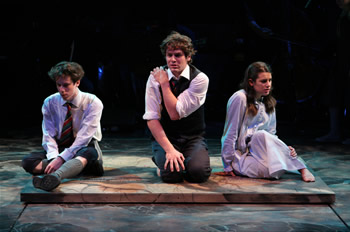HotReview.org Editor's
Picks
Shows Worth Seeing:

Spring Awakening
Based on the play by Frank Wedekind
Book and Lyrics by Steven Sater
Music by Duncan Sheik
Atlantic Theater Company
336 W. 20th St.
Box office: (212) 239-6200
It’s been a long time since Wedekind’s Spring Awakening truly scandalized anyone. Published at the author’s expense in 1891 and subject to decades of censorship afterward, this story of adolescent angst driven by sexual awakening is too penetrating and scathing ever to be wholly dated. But the challenges for production are nevertheless steep in a society as thoroughly sexualized as ours. Wedekind’s kid-characters first get into trouble, for instance, from lack of access to information about sex and anatomy that’s now a mouse-click away, and their stiff, Wilhelminian parents too easily come off as caricatures today. The makers of this buoyant and superbly executed musical version have solved these problems by skipping past them, simply bracketing them as historical background and rushing on to the presumably more urgent matter of enacting burgeoning sexuality in the present. The songs by Duncan Sheik are all rock melodies in the indie vein of The Shins and Yo La Tango, performed by the wonderful young cast with infectious fervor. Michael Mayer’s direction and Bill T. Jones’s choregraphy wisely keep up this focus—on driving physical energy that constantly seeks outlets. The text by Steven Sater unfortunately lacks interesting insight into Wedekind’s drama; songs are appended to a severely attenuated plot like ornaments on a scrawny Christmas tree, fooling no one. Still, the evening gathers surprising cumulative power from the force of the score and the conviction of the cast, leaving a sparkling sense of pleasure and wonder. That may not be quite what Wedekind had in mind, but it’s a notable achievement in its own right.
----------------------------

The History Boys
By Alan Bennett
Broadhurst Theatre
235 W. 44th St.
Box office: (212) 239-6200
Not since Michael Frayn’s Copenhagen has a truly
serious play arrived on Broadway that is so enjoyable it makes
people forget it’s actually good for them. Alan Bennett’s
The History Boys--about students prepping for Oxford
and Cambridge entrance exams at a second-tier English boys’
school during the Thatcher years--raises hugely important questions
about the basic purpose of education, questions that have practically
dropped off the map of public debate in the U.S. Two teachers
represent two widely divergent views: one values knowledge for
its own sake, the other regards it cynically and functionally
as a means to an end. To his credit, Bennett recognizes that the
boys need them both to succeed. This good-natured dispute is played
off against a somewhat stickier teacher-student sex scandal, which
thankfully is never allowed to overwhelm the delightful play of
ideas. Nicholas Hytner’s production, with the original cast
from the National Theatre in London, runs 2 hours 40 minutes but
feels quick and efficient. This is superb work—sharp, moving,
alternately light and heavy in mood, with dauntingly strong and
sympathetic ensemble playing. The eight young actors who play
the boys relish their parts so openly it’s infectious.
------------------------

Awake and Sing!
By Clifford Odets
Belasco Theatre
111 W. 44th St.
Box office: (212) 239-6200
I’ll confess I had few expectations when Lincoln Center
Theater announced this revival of Odets’s 1935 classic about
the disintegration of a New York Jewish family during the Depression.
Whatever my unkind thoughts, however—mostly to do with pandering
to the nostalgia of geriatric subscribers—I’ve now
forgetten them. Bartlett Sher’s production is so intelligent,
passionate and splendidly cast that it makes a fresh case for
Awake and Sing! as a play for the ages. Handled by such
a terrific cast, Odets’s language actually displays the
jazz-like cadences his fans are always crowing about. The action,
here, really rises to a sense of Chekhovian heartbreak, rather
than bogging down—as usual in my experience—in the
vain self-congratulation of emotionally strenuous method acting,
and in painstaking realism worshiped for its own sake. Michael
Yeargan’s set cleverly siphons away security on multiple
levels at once, with the walls of the family’s cramped apartment
gradually disappearing over the play’s three acts, exposing
both the innards of the apartment building and the void behind
conventional genre—a profound void in the hands of an author
with something significant to say about human frailty. This show’s
ensemble work is as good as The History Boys’—a
high compliment—and that self-sacrificing cooperation is
the primary source of the production’s strength. That said,
a few individual performances also deserve special praise, for
sheer acuteness of observation and execution: Mark Ruffalo as
the disabled, two-bit shyster Moe Axelrod, Ned Eisenberg as rich
and cagey Uncle Morty, and Pablo Schreiber as the yearning young
hero-manqué Ralph Berger. Odets doubters beware—this
production may convert you.
----------------------------------

Shining City
By Conor McPherson
Biltmore Theatre
261 W. 47th St.
Box office: (212)239-6200
Manhattan Theatre Club might well call 2006 its season of the
unfinished play. In the winter we had John Patrick Shanley’s
Defiance, essentially the tantalizing first half of a
two-act problem play the author presumably lacked the patience
to complete. Now Conor McPherson’s Shining City
similarly lays out a powerful plan of parallel character studies—of
a therapist and patient in contemporary Dublin—but disappointingly
skimps on one of them in the end. As it happens, there’s
enough in this half-play to make it feel at least two-thirds finished
and well worth seeing. Because McPherson is a master of monologue,
his plays depend on actors with riveting storytelling prowess,
and Oliver Platt and Brian F. O’Byrne are both superb in
this regard, in a tight production directed by Robert Falls. Their
long confessional speeches are such delectable ear-candy that
one almost overlooks that McPherson neglected to probe
his therapist character’s background sufficiently to give
real psychological depth to the play’s thriller ending.
